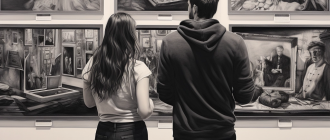Discover the top 10 best black churches in Atlanta, GA. From Ebenezer Baptist Church to Buckhead Church, find solace and strength in these sacred spaces ⛪️
Black Churches in Atlanta, Georgia: A Rich History of Community, Faith and Activism
Atlanta, Georgia is home to a thriving community of historic black churches that have served as pillars of faith, activism and community organizing for generations. Tracing their roots back over a century, these congregations and their leaders have been at the forefront of the fight for civil rights, racial justice and the betterment of African American lives. This article explores some of Atlanta’s most prominent and influential black churches and their legendary impact.
Ebenezer Baptist Church
No discussion of influential black churches in Atlanta would be complete without first highlighting Ebenezer Baptist Church. Founded in 1886 and located on Auburn Avenue in downtown Atlanta, Ebenezer Baptist is arguably the most famous black church in the city. It rose to international prominence as the spiritual home of Dr. Martin Luther King, Jr., who co-pastored the church alongside his father from 1960 until his assassination in 1968.
Ebenezer Baptist served as the center of planning and organizing for America’s civil rights movement during the 1950s and 1960s. Dr. King delivered many of his most memorable sermons from Ebenezer’s pulpit, outlining his vision of racial equality, integration, nonviolence and beloved community. Today, Ebenezer continues to carry out Dr. King’s legacy under the leadership of its current senior pastor, Reverend Raphael Warnock, elected in 2020 as Georgia’s first African American U.S. senator.

Big Bethel AME Church
With roots dating back to 1847, Big Bethel AME Church is Atlanta’s oldest predominantly African American congregation. Founded several years before the Civil War, Big Bethel met in various locations before securing its current home on Auburn Avenue. In the late 19th century, Big Bethel’s basement housed the first public school for African American students in Atlanta.
Known historically as “Sweet Auburn’s City Hall,” Big Bethel has long served as a political, educational and social anchor for the African American community. Its leaders and members have been involved in various justice initiatives over the decades. Big Bethel represents an enduring legacy of faith and community uplift.
New Birth Missionary Baptist Church
One more recent but highly influential African American church in Atlanta is New Birth Missionary Baptist Church. Founded in 1984, New Birth has grown rapidly over the past four decades into a 25,000 member congregation with over 40 active ministries. Its sprawling campus is located in Lithonia, Georgia, just outside Atlanta’s city limits.
New Birth’s senior pastor Bishop Eddie L. Long led the church for many years before his passing in 2017. The church runs programmes aimed at community improvement, from adopting schools to providing healthcare access and jobs training. New Birth also has a large youth ministry and hosts conferences on social justice issues.
Word of Faith Family Worship Cathedral
Led by Bishop Dale C. Bronner, Word of Faith Family Worship Cathedral is another large, predominantly black megachurch based in southern Atlanta metro. Founded in 1987, Word of Faith now counts over 19,000 members and has six locations.
Word of Faith is dedicated to “Love, Live, Give,” providing community outreach locally and globally. From feeding programs to medical clinics to entrepreneurship training, Word of Faith aims to empower those in need. Its main campus in Austell, GA houses extensive facilities for youth activities.

Victory World Church
With its main campus in Norcross, GA, Victory World Church is a multi-ethnic but predominantly African American congregation founded by its senior pastors Dennis and Teresa Rouse. Launched in 1991 with just 17 people, Victory World has exploded in growth over the past three decades, expanding to over 20,000 members.
Victory World is associated with the Southern Baptist Convention but aims to welcome everyone with open arms. The church is particularly focused on community service initiatives like supporting foster care, prison reform, anti-trafficking and urban renewal. Victory World aspires to build bridges and make a difference across Atlanta.
Wheat Street Baptist Church
Wheat Street Baptist Church traces its beginnings to 1869 when it was established to serve newly freed African Americans in Atlanta. The original structure was built near a railroad viaduct on Mitchell Street before relocating across from Atlanta University. For generations, Wheat Street Baptist has fostered education and civic engagement.
In the 1960s, its pastor Reverend William Holmes Borders worked alongside Dr. King and other civil rights leaders in integrating Atlanta’s public transit system. The church also hosted Atlanta’s NAACP meetings during that pivotal era. Wheat Street Baptist continues to promote community advancement and social justice today.
Friendship Baptist Church
Organized in 1862 amid the Civil War, Friendship Baptist Church is Atlanta’s oldest African American Baptist congregation. Friendship Baptist provided early gathering spaces for two of the South’s historically black colleges and universities – Morehouse College held classes in its basement starting in 1879 and Spelman College opened its doors there in 1881.
Known as the “Mother Church” among Atlanta Baptists, Friendship Baptist has birthed and nurtured other prominent congregations. Its storied history is intertwined with Atlanta University, Morehouse, Spelman and the surrounding community. Friendship Baptist remains a bastion of faith and education.
First Congregational Church
First Congregational Church was founded in 1867 by formerly enslaved African Americans seeking spiritual community and liberty. As the second oldest black Congregational church in America, First Congregational established its first home on Courtland Street in downtown Atlanta.
Its early 20th century pastor, Dr. Henry Hugh Proctor, was a pioneer in black higher education and led efforts to construct the church’s current home – completed in 1908 with Booker T. Washington in attendance. First Congregational continues its justice-oriented ministry and community service into the 21st century.
Cascade United Methodist Church
Organized in 1932, Cascade United Methodist Church is Atlanta’s oldest predominantly black Methodist congregation. Its storied membership roll includes luminaries like civil rights activist Reverend Joseph E. Lowery who pastored Cascade for 18 years.
Along with neighboring black churches, Cascade played a vital role in the 1950s and 1960s civil rights movement – working to desegregate schools, public facilities and voting access in Atlanta. Cascade promotes spiritual growth and social justice to this day.

Shrines of the Black Madonna
The Shrines of the Black Madonna church represents a slightly different stream of Black religious tradition in Atlanta. Founded in the 1950s by Rev. Albert Cleage, it belongs to the Pan African Orthodox Christian Church and emphasizes black liberation theology. The Atlanta shrine opened in 1975 and operates a bookstore promoting African heritage and culture.
It provides community outreach while adhering to its unique self-identity as a “Hebrew-Christian” congregation that venerates black motherhood and upholds African historical identity. The vibrant liturgy and Afrocentric theology of the Black Madonna Shrine fill an important niche.
Atlanta’s historically black churches stand as pillars of strength, symbolizing the enduring spirit of African American communities in the city. Ebenezer Baptist Church, where Dr. Martin Luther King Jr. preached, holds a special place in American history as a hub of the civil rights movement, its legacy extending far beyond Georgia’s borders. Similarly, Wheat Street Baptist Church has played a pivotal role in nurturing spiritual growth and fostering a sense of unity among its congregation. Big Bethel AME and First Congregational have served as beacons of hope, promoting social justice, education, and civic engagement. Their collective impact has transcended religious boundaries, influencing Atlanta’s public life and shaping the city’s identity. These churches continue to be sources of inspiration and catalysts for change, driving progress and resilience among the African American community.


